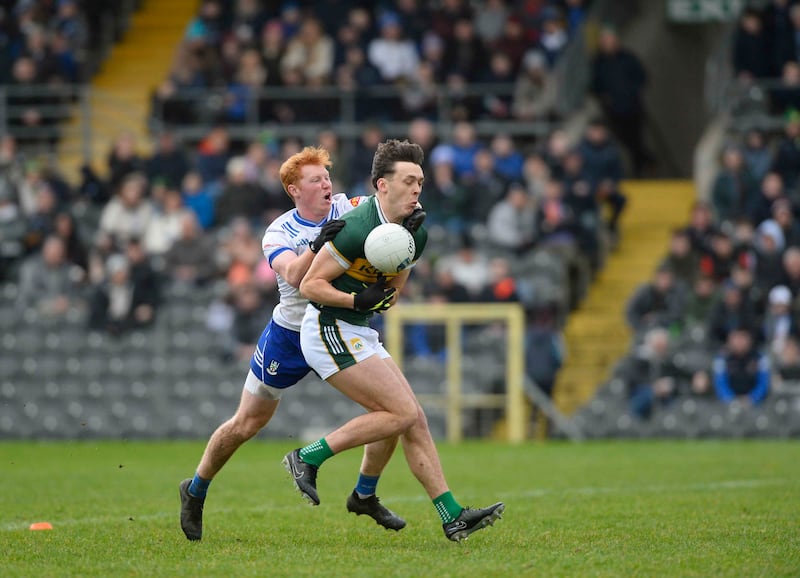Tactics. Teams need them, for supporters it sometimes feels we need a PhD to understand them.
Long gone are the days when the ball was hoofed by the goalkeeper as far away as possible up to the forwards to let them fight for it.
A cold sweat would have broken out among fans, if they saw the full back line dithering with the ball. “Kick it on to…” - You can add your own name here.
Games now are tactical and each era brings another layer of evolution to.
We have seen very defensive set-ups in the past but the latest round of the Allianz Football League show us that perhaps the trend is turning to more attack-minded football.
Positions no longer have the same meaning as most half-forwards play in the half-back line and vice versa.
The goalkeeper has to be one of the most skilled kickers of the game, able to take points as well as the traditional skillset of stopping shots and kick outs. They also have to act as an extra outfield player when opposition kick outs are taking place.
Pressing up on these kick outs are a given, but the lateral passing and the back pass may be changing. Instead, we are seeing an effort to go for scores from long distance, to go one-on-one and to get the ball quicker into the scoring zone once possession has been won by the team on the attack.
This is a point Donegal manager Jim McGuinness made on the DL debate with Brendan Devenney on Highland Radio recently.
I think there is a lot expected of Jim and what new evolution of football he will come up with.
He changed the way football was played, helping to evolve it into a more defensive mindset. That was how he felt Donegal could win with the players they had at that time.
It remains to be seen if this new quickm attacking dimension he has added becomes his new philosophy come Championship time.
The philosophy of the manager is interesting.
We know what Pep Guardiola and Jurgen Klopp’s philosophy is. Pep’s is centred around possession-based football, high pressing and a focus on technical ability.
Klopp asks for a high energy and intense style of play and his teams are known for their pressing and counter attacking abilities.
Any player that signs for them knows what is expected of them. The manager’s philosophy works because they have the budget to entice the best players to their teams. It helps that both are successful and players want to work with them too.

What do we know then about each GAA team’s philosophy at the moment? Are managers confident in what that is?
We can make educated guesses but as Bill Shankly would say “football is a simple game” and it is always won by the team that makes the fewest mistakes and gets their best players on the ball at the opportune time.
It’s simple but it’s not easy to execute on a consistent basis and this has proven problematic already for some teams.
So what have we seen so far? Dublin perhaps understandably are error strewn and their lack of composure at key junctures and mistakes leaves them at the bottom of the Division One table.
They have uncharacteristically lost crucial turnovers that have led to defeats against Monaghan and Mayo.
The defence conceded four goals in two games and switched off as Ryan O’Donoghue’s brilliant vision set up Fergal Boland with a quick pass that saw Mayo win the round two game.
Mayo sit top of the table and their direct play is paying dividends for them. It is very early days but consistency and excellence is a habit and a lack of both is a habit that Dublin do not want to fall into.
Tyrone have struggled with consistency in the past and that reared its head again against Derry at the weekend.
They have players to come back but 10 wides in the second half, challenges with Derry’s running game and 33 minutes either side of the break without a score is something they will not be happy with.
Derry look really good, focussed and purposeful. They have added to the strength of the team with Cormac Murphy the stand out at the weekend. They will hope injuries and lack of energy and form later in the year does not affect them.
Conditions were difficult at Hyde Park and scores were not easy to come by for either side. A draw then was welcomed by Roscommon and Galway as the sides lost their opening matches.
It’s difficult for both managers to take a lot of learning from this. A cohort of players are injured and are not available to both teams so they are not at their strongest.
From the highs of winning against Dublin to the lows of a nine-point defeat to Kerry, it is humbling for Monaghan.
They had their opportunities to get goals in the first half but didn’t take them.
The positives are the new players and the likes of Michael Hamill and Ciarán McNulty carrying good form into week two.
The negatives are losing more players through injury. Kerry took their goal chances this week, but Seán O’Shea and the returning Clifford brothers made the difference.
Life is a lot easier when you have talented players of their calibre.
Managers are still working on their philosophy, looking to evolve a system that caters to the strengths of the players they have at their disposal.
It’s challenging to do this when you don’t have injured players available. It is without a doubt a work in progress and one I look forward to following over the coming months.
As Vinny Corey said: “There is no soft landing in Division one”. For some teams, they are going to find out just how bumpy that ride will be.




